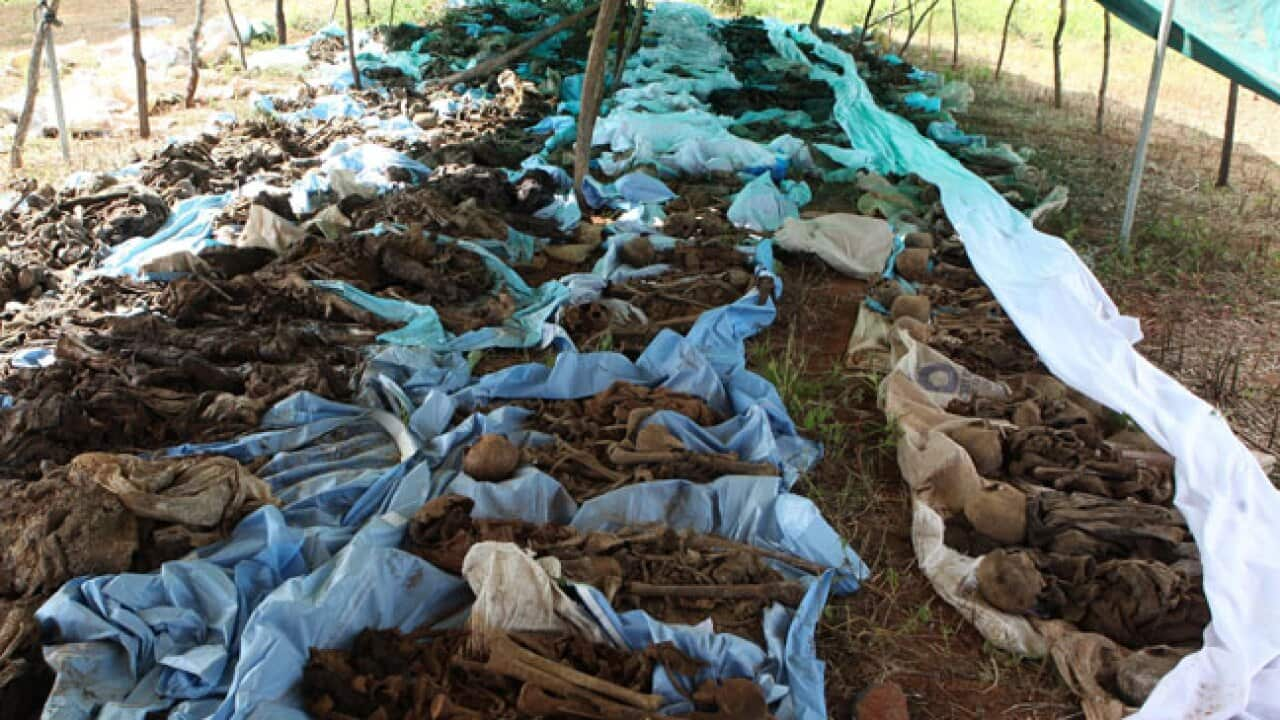Hundreds of skeletons found in a remote mine shaft have brought a macabre thrust to election campaigning in Zimbabwe - but the presence of some corpses still with skin, hair and body fluids has raised doubts over claims white colonial-era troops committed the massacres more than 30 years ago.
Pathologists say visual evidence may point to more recent killings in a country plagued by election violence and politically motivated murders.
Since President Robert Mugabe called for elections later this year to end a troubled two-year power-sharing coalition with the former opposition, his party and state media have mounted an intense campaign to discredit political rivals and western critics of his authoritarian rule.
The Fallen Heroes of Zimbabwe Trust, a previously little known group of Mugabe party loyalists, last month launched a program to exhume skeletons in the mine shaft.
They say the country's former rulers were guilty of human rights violations that far outweigh any accusations of rights abuses levelled against Mugabe's party and his police and military.
Citizens urged t visit mine to witness horror
Zimbabwe's sole broadcaster, in news bulletins and repeated interruptions to regular programs, has urged ordinary citizens to visit the disused Chibondo gold mine near the provincial centre of Mount Darwin, 160km from Harare, to witness the horror of colonial atrocities.
Reporters taken to Monkey William Mine at Chibondo on a trip organised by Mugabe's Ministry of Information said school children were bussed there.
Militants sang revolutionary songs, shouted slogans and denounced whites and Prime Minister Morgan Tsvangirai's pro-Western party for its links with Britain, the former colonial power.
"Down with whites. Not even one white man should remain in the country," villagers, evidently carefully choreographed, proclaimed.
They danced at the site in what was said to be an ancient ritual to appease the spirits of those killed by white troops before independence in 1980.
Villagers appeared to go into trances and others wept and simulated firing guns.
Journalists found a body with 'blood and fluids'
Exhumed skeletons, bones and remains lay in random heaps, some covered by sheets and blankets, near a pile of coffins.
Hair and clothes were clearly visible; one corpse wore black tennis shoes.
The mine shaft emitted an overwhelming stench.
Journalists who descended a 40m shaft found a body with what appeared to be blood and fluids dripping on to the skulls below.
Jimmy Motsi, a leader of the trust group, told reporters the remains of more than 640 bodies have already been removed.
Four other mine shafts in the district contain human remains, he said.
The Mount Darwin district saw some of the fiercest fighting in the seven-year bush war waged by Mugabe's guerrillas that ended white rule and swept him to power.
Former colonial soldiers say guerilla dead were disposed of in mass graves often doused with petrol or acid.
Forensic tests and DNA analysis of the remains would not be carried out, said Saviour Kasukuwere, the government minister of black empowerment.
African rites to identify the dead
Instead, traditional African religious figures will perform rites to invoke spirits that will identify the dead, he said.
Kasukuwere said the Chibondo remains were discovered in 2008 by a gold panner who crawled into the shaft.
But spirits of war dead had long "possessed" villagers and children in the district, he said.
"The spirits have refused to lie still. They want the world to see what Smith did to our people.
These spirits will show the way it's to be done," he said, referring to Ian Smith, the last white prime minister of the former colony of Rhodesia.
"This is the extent of atrocities committed by the Smith regime.
They loot our resources and they close up the mine with our bodies."
Tsvangiria's party has called for scientific research and "informed debate and reflection" on all violence that included killings of its supporters surrounding disputed elections in 2008.
The party stopped short of alleging the corpses at Chibondo could include its supporters who have disappeared and remain unaccounted for in years of political and economic turmoil.
Zimbabwe's own pathology and autopsy facilities have been crippled by the country's economic meltdown under Mugabe's rule.
No DNA testing is available locally
Maryna Steyn, a forensic anthropologist at the University of Pretoria in South Africa, said human remains should not retain a strong stench after 30 years.
"Usually, when we have remains that are lying around for more than a few years, the bones are no longer odorous," she said.
Steve Naidoo, a pathologist at South Africa's University of KwaZulu-Natal, said it "seemed strange" that bodies from three decades ago would still have some skin.
"Bearing in mind that the bodies are exposed to an open environment, albeit in a mine shaft, scavengers can access them quite easily.
In 30 years, one would expect complete and advanced skeletonisation," he said.
But Shari Eppel, a Zimbabwean activist of the Solidarity Peace Trust, said in the group's latest Zimbabwe bulletin that the presence of soft tissue "is not necessarily an indicator that these bones entered the grave more recently, although it could be".
A process of mummification can occur when bodies are piled on top of each other in large numbers and to all but the most expert eye "mummified flesh will look the same as rotting soft tissues from a more recent era", Eppel said.
Only expert forensic anthropologists can establish ages, the sex and causes and dates of death from a complete set of skeletal remains.
The era of the manufacture of clothing, coins, belt buckles and other items would also be taken into account in seeking to identify the dead.
Eppel said the remains are being indiscriminately hauled from the Chibondo mine shaft without decency, respect or any regard for traditional African customary beliefs on reverence for the deceased.
Share

